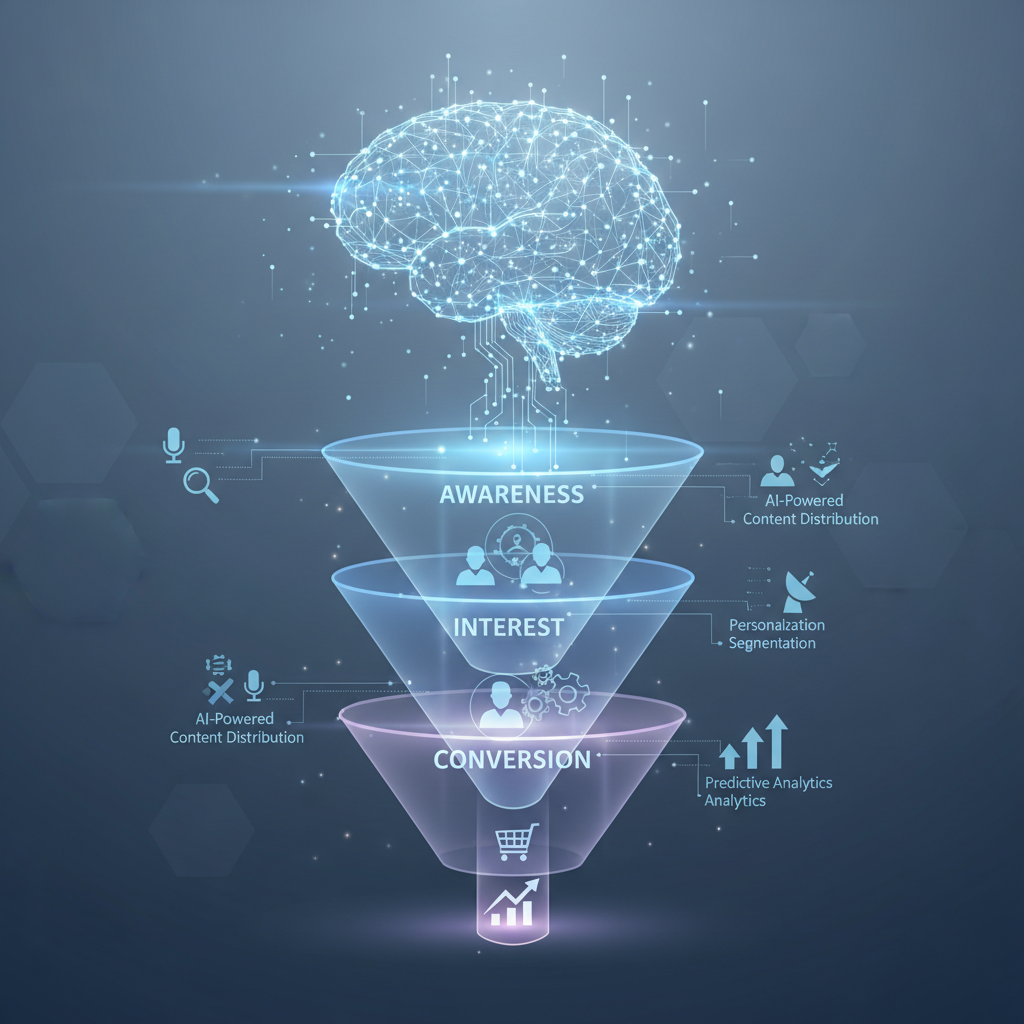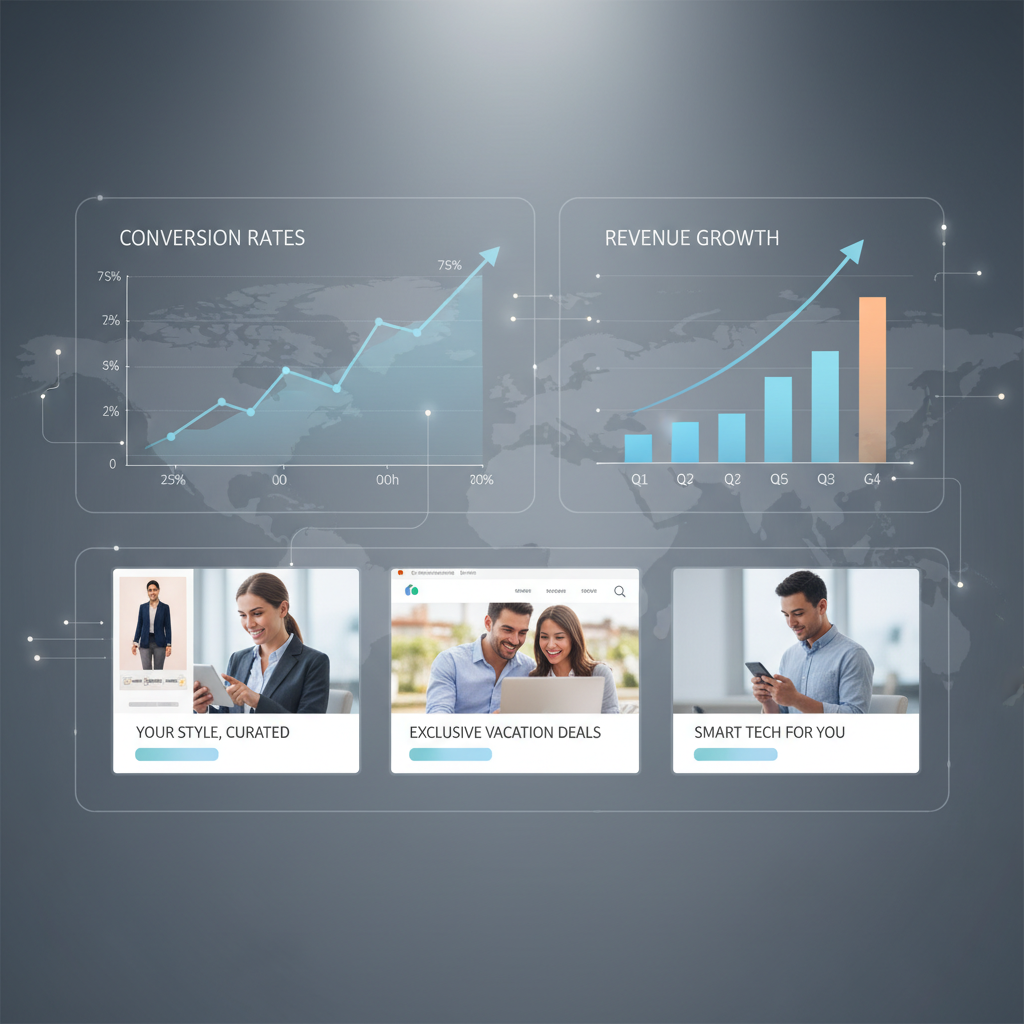
Artificial intelligence is transforming the marketing landscape, with over 80% of marketers now leveraging AI tools across their campaigns. Despite widespread adoption, research indicates that 74% of companies are still not capturing sufficient value from their AI marketing investments.
Key Highlights
Here are the main takeaways from the research:
- B2B marketers are at the forefront of AI adoption with 81% already using generative AI technologies.
- ChatGPT and similar tools have enabled marketers to create content up to 4x faster than traditional methods.
- AI-driven personalization meets rising consumer expectations, with 71% of customers now expecting personalized experiences.
- Companies using predictive intelligence in marketing see an average 22.66% lift in conversion rates.
- Organizations with advanced AI marketing implementations report 60% higher revenue growth compared to slower adopters.
Understanding the AI Marketing Revolution

Part 1: The Value Proposition
The integration of artificial general intelligence into marketing represents a fundamental shift in how brands connect with potential customers. AI marketing technologies span the entire customer journey, from initial awareness through consideration and ultimately to conversion. The value of these technologies lies in their ability to process vast amounts of data and extract actionable insights at a scale impossible for human marketers alone. Research shows that while adoption rates are high, many organizations struggle with implementation strategies that maximize return on investment. For businesses looking to enhance their digital marketing efforts, video marketing automation with AI offers a powerful entry point.
Part 2: The Technology Foundation
Modern marketing AI systems build upon several core technologies, including machine learning algorithms, natural language processing, and predictive analytics. These systems can analyze customer behavior across dozens of dimensions simultaneously, far beyond the capabilities of traditional demographic segmentation. Machine learning models continuously improve as they process more data, identifying patterns that human analysts might miss. OpenAI‘s language models have been particularly transformative, enabling marketers to automate content creation while maintaining quality and brand consistency. The difference between early rule-based marketing automation and today’s AI systems is profound—modern solutions can adapt to changing conditions and learn from outcomes without explicit programming.
Real-World Applications Across the Marketing Funnel

Part 1: Top-of-Funnel Awareness
At the awareness stage, AI excels at predicting which content will resonate with specific audience segments. Predictive content distribution systems analyze B2B buyer search patterns and social media sentiment to place messages where potential customers are most receptive. Voice search optimization, powered by natural language processing, ensures brand visibility in an increasingly voice-first search environment. Wiz AI and similar platforms enable marketers to create hyper-targeted campaigns that adapt in real-time based on engagement metrics. The integration of AI tools with social listening platforms has revolutionized trend identification, allowing marketers to join conversations at precisely the right moment for maximum impact.
Part 2: Conversion Optimization
As prospects move through the marketing funnel, chatbots have become essential tools for guiding potential customers toward conversion. Implementation of AI-powered chat solutions has led to 50% improvements in conversation value by providing personalized responses at scale. Email marketing enhanced with predictive intelligence shows 94% higher conversion rates compared to traditional approaches. AI-driven sales solutions leverage advanced customer segmentation to identify high-potential prospects based on behavioral patterns rather than simple demographics. The most sophisticated systems can now analyze more than 30 customer dimensions simultaneously, creating granular segments that enable precisely tailored messaging and offers.
Future Outlook and Strategic Implementation

Part 1: Emerging Trends
The future of AI marketing will be characterized by increasingly seamless cross-channel experiences powered by unified customer data platforms. Quillbot’s content optimization technology represents the emerging trend toward AI tools that enhance rather than replace human creativity. As recommendation engines continue to evolve beyond the Netflix and Amazon models, they will incorporate more contextual awareness and emotional intelligence. Research indicates that companies implementing cross-funnel AI technologies experience more consistent customer journeys and higher lifetime value. For organizations seeking to stay competitive, AI-powered content generation will become a necessity rather than an advantage.
Part 2: Implementation Strategies
Organizations looking to maximize AI marketing ROI should prioritize integration across existing systems rather than implementing isolated point solutions. Successful implementations typically begin with clearly defined use cases tied to specific business outcomes rather than technology-first approaches. Budget allocation trends show increased investment in AI marketing tools, with particular emphasis on capabilities that connect different stages of the customer journey. Open AI‘s technologies have democratized access to sophisticated marketing capabilities that were previously available only to enterprise organizations with large data science teams. The most successful organizations are those that combine AI capabilities with strong human oversight, creating marketing processes that leverage both machine efficiency and human creativity.
Outro
AI marketing technologies have evolved from experimental tools to essential components of the modern marketing stack, transforming how organizations engage with prospects across the entire customer journey. The organizations seeing the greatest success are those that approach AI implementation strategically, focusing on specific business outcomes rather than technology for its own sake. As these technologies continue to mature, they will further blur the line between marketing channels, creating more integrated experiences that meet customers with the right message at precisely the right moment.
Sources
OpenAI Blog
McKinsey Global Institute
MIT Technology Review
Gartner
PwC AI Outlook
